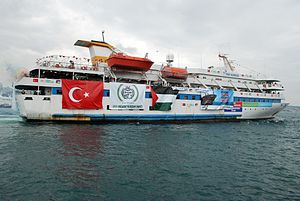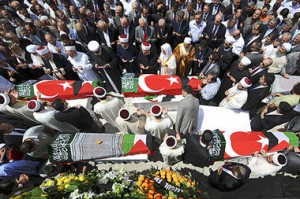 A Turkish court has launched the trial in absentia of four former Israeli military commanders over the deaths of nine Turkish activists on board a ship bound for Gaza in 2010. Israel has denounced the move as a “show trial”.
A Turkish court has launched the trial in absentia of four former Israeli military commanders over the deaths of nine Turkish activists on board a ship bound for Gaza in 2010. Israel has denounced the move as a “show trial”.
The court hearing, in which almost 500 people are expected to give evidence, will further strain relations between the two former allies which suffered a serious breach following the deadly assault on the Mavi Marmara.
Tensions will be exacerbated if Turkey’s prime minister, Recep Tayyip Erdogan, follows through on his intention, announced last week, to make an official visit to Gaza in the near future. Such a move which would give a significant political boost to Hamas, the Islamist faction which controls the impoverished coastal strip.
The former senior Israeli military commanders are accused of inciting murder and injury in a 144-page indictment. Prosecutors are seeking multiple life sentences for the four, who include the former chief of staff, Gabi Ashkenazi.
Israel’s foreign ministry said in a statement that the trial “clearly falls under the category of a show trial, an act which has nothing to do with either law or justice”. The trial, it added, was “merely a propaganda display. It would be in Turkey’s interest to deal with this issue through bilateral dialogue.”
Since the incident, Turkey has demanded an apology and compensation for the victims’ families from Israel. Israel has expressed regret over the deaths, but has refused to apologise.
The Mavi Marmara was part of a flotilla of ships attempting to breach Israel’s blockade of Gaza. Israeli commandos stormed the flotilla in international waters, shooting dead nine activists.
Erdogan described the incident as “state terrorism”. Israel said hardcore militants, intent on a violent confrontation, were among the Marmara’s passengers.
Relations between the two countries have never been repaired. After a UN report in September 2011 concluded that Israel’s naval blockade of Gaza was justified but it had used “excessive and unreasonable” force, Turkey expelled Israel’s ambassador.

The four on trial are Ashkenazi; Eliezer Marom, former commander of the Israeli navy; Amos Yadlin, former commander of the air force; and Avishai Levy, former head of air force intelligence.
The case would have a “devastating effect on Turkish public opinion of Israel,” said Alon Liel, a former Israeli envoy to Ankara. “All participants in the flotilla have been invited to testify. The exposure will be catastrophic to relations.”
He said that “three months of constant Israel-bashing” during the trial would damage the chances of Israel apologising for the incident.
Erdogan said last week that he planned to visit Gaza, although no date was specified. Following the visit last month by the Emir of Qatar, the first head of state to visit the enclave, an official Turkish visit would be seen as further legitimisation of Hamas and an affront to the West Bank-based Palestinian president, Mahmoud Abbas.
According to Liel, a visit was possible because of the good relations between Erdogan and the Egyptian president, Mohamed Morsi. The Turkish prime minister would need Egypt’s permission to cross the border into Gaza from the Sinai.
An official Turkish visit would have “enormous implications,” he said. “It would create a more positive image for Hamas in the moderate Arab world, and would be a blow to [Hamas rivals] Fatah, and to Israel.”
Turkey has been acclaimed in Gaza since the Mavi Marmara incident. A large monument stands on the quay of Gaza City’s fishing port, and Turkish flags fly from buildings and lampposts throughout Gaza.
Guardian

Leave a Reply
You must be logged in to post a comment.